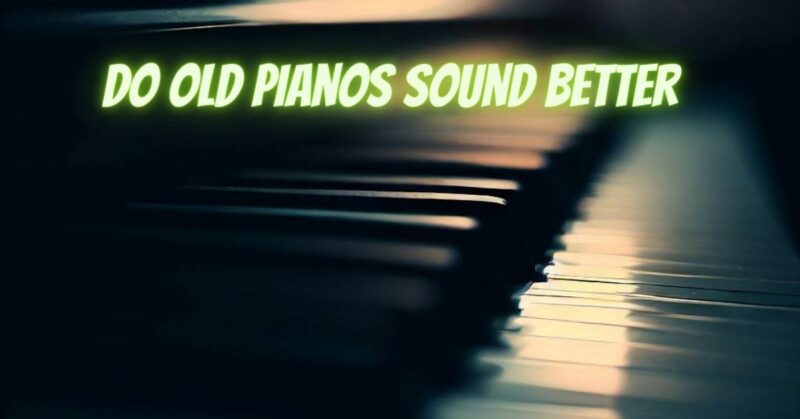When it comes to the enchanting world of pianos, the allure of older instruments and their captivating sound often sparks curiosity. Many musicians and enthusiasts wonder whether old pianos truly possess a superior and unique tonal quality compared to their modern counterparts. In this article, we will delve into the debate surrounding the sound of old pianos, exploring the factors that contribute to their distinctiveness and discussing whether they can be considered as sounding “better.”
- Historical Significance and Craftsmanship: Old pianos, especially those from renowned manufacturers and specific eras, can hold historical significance and exhibit exquisite craftsmanship. These instruments were meticulously crafted by skilled artisans, using premium materials and traditional methods. The combination of superior craftsmanship and vintage components may contribute to the distinct tonal characteristics and aesthetic appeal of old pianos.
- Aging and Wood Maturation: One theory behind the perceived superiority of older pianos is the notion that the wood used in their construction has had more time to mature and resonate. Over time, the wooden components of a piano, such as the soundboard and bridges, can undergo subtle changes, potentially enhancing the instrument’s sound quality. The aging process can lead to greater resonance and depth, adding a unique richness to the piano’s tonal palette.
- Individual Variability: It’s important to note that not all old pianos will automatically sound better than their modern counterparts. Each piano, regardless of age, possesses its own individual characteristics and tonal qualities. Factors such as the quality of materials, maintenance history, and overall condition play a significant role in determining the sound of a piano. While some old pianos may exhibit exceptional sound, others may require restoration or exhibit tonal limitations.
- Modern Manufacturing Techniques: Advancements in technology and manufacturing techniques have allowed modern piano makers to create instruments with exceptional sound quality. Today’s pianos often undergo rigorous quality control processes, benefiting from precision engineering and advancements in materials and design. These factors contribute to the production of pianos that can rival the tonal excellence of older instruments.
- Personal Preference: The perception of sound quality is highly subjective and varies from person to person. What one individual considers a “better” sound may differ from another’s preferences. Factors such as playing style, musical genre, and personal taste heavily influence the perception of sound quality. Some individuals may prefer the warmth and character of older pianos, while others may gravitate towards the clarity and precision of modern instruments.
Conclusion:
Determining whether old pianos sound better is a complex and subjective matter. While some old pianos possess distinct tonal qualities and historical significance, it’s important to recognize that not all old instruments will automatically sound superior to newer ones. Factors such as craftsmanship, wood maturation, individual variability, modern manufacturing techniques, and personal preference all contribute to the perception of sound quality. Ultimately, the “better” sound is a matter of personal preference and the specific attributes desired by the pianist. Whether you choose an old or a modern piano, it is crucial to evaluate the instrument’s condition, tonal characteristics, and playability to ensure it meets your musical aspirations and preferences.


